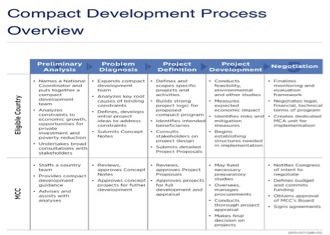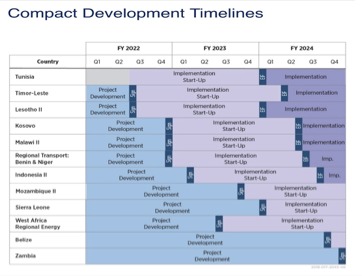The Millennium Challenge Corporation (MCC) was established by the Millennium Challenge Act of 2003 by the 108th United States Congress. Congress approved the new initiative in January 2004. The act established the foundation of the Millennium Challenge Corporation, which is “based on the principle that aid is most effective when it reinforces good governance, economic freedom, and investments in people. MCC’s mission is to reduce global poverty through the promotion of sustainable economic growth.”
The MCC represents a significant change in the way the United States delivers economic assistance. The concept differs in several respects from past and current U.S. aid practices at other agencies, including but not limited not:
• a competitive process that rewards countries for past actions measured by objective performance indicators.
• a mission to seek poverty reduction through economic growth, not encumbered with multiple sector objectives.
• a requirement to solicit program proposals developed primarily by qualifying countries with broad-based civil society involvement.
The MCC operates two types of assistance programs: a long-term, large-scale investment in a country, known as a Compact, and a short-term, more narrowly defined effort to help prepare possible candidates for compact eligibility, known as the Threshold Program. MCC compacts are five-year grant agreements proposed and implemented by well-governed countries. Compacts aim to achieve poverty reduction through economic growth by targeting the principal “binding constraints to growth” in an economy.
Threshold programs are smaller, shorter (usually two- to four-year) programs designed to assist promising candidate countries to become compact eligible. Threshold programs originally addressed shortcomings in a country’s qualifying indicators, especially corruption, the most common cause of a failing scorecard. At the request of Congress, MCC conducted an extensive review of its threshold programs. Rather than individual indicators, threshold programs since 2011 have targeted the broader policies affecting a country’s scorecard performance through programs oriented on potential binding constraints to growth.
Deliberations for the MCC program to be instituted in Sierra Leone started in 2007. The deliberations culminated in a December 2008 letter written by former President Ernest Bai Koroma to Ambassador John Danilovich, CEO, Millennium Challenge Corporation, requesting an MCC Threshold Grant. In the letter, former President Koroma stated, “I have decided to personally make this request for consideration for a Threshold Grant within the next year. The primary indicators I have selected for improvement that will fall under the auspices of the MCA Task Force I have set up are: ‘Control of Corruption’ and land reform in the 2009 scorecard.”
In December 2012, Sierra Leone was selected by the MCC board of directors to develop a Compact after passing 12 indicators on the Fiscal Year (FY) 2013 scorecard, including the hard hurdle, Control of Corruption, with a score of 53%. The country set up the Millennium Challenge Coordinating Unit (MCCU) as the local implementing partner with a National Coordinator and staff. However, Sierra Leone failed the hard hurdle ‘Control of Corruption’ indicator with a score of 47% the following year on the MCC FY 2014 scorecard. Although the country passed half of the scorecard by passing 11 indicators, at its board meeting in December 2013, Sierra Leone was not re-selected to continue Compact Development. Though the MCC stated, it would maintain ‘continued but limited engagement’ with the country.

Figure 1. Compact Development Overview
The country’s Control of Corruption indicator nosedived on the MCC scorecard as Sierra Leone did not pass the Control of Corruption indicator between FY 14 and FY 17. However, in 2015, the Government of Sierra Leone and the United States Government signed a $44.4 million Threshold Program, which supported institutional strengthening in the water and electricity sectors. The program closed out in 2021.
In December 2020, Sierra Leone was again selected by the MCC board of directors as eligible for compact development after passing 11 indicators on the FY 21 scorecard, with a score of 71% on the hard hurdle ‘Control of Corruption’ indicator and pass on other hard hurdle indicators under the Democratic Rights category. It should be noted that once a country is selected as eligible for a compact, it must typically be reselected each year until the compact is approved (usually 2-3 years), it also requires a consistent pass of the Control of Corruption indicator. The country has witnessed a regular pass on both the Control of Corruption and Democratic Rights “hard hurdles” indicators and have passed more than half of the scorecard since President Julius Maada Bio’s election in 2018.
Control of Corruption percentages between Fiscal Years 2019-2023:
• FY 2019: 71%
• FY 2020: 79%
• FY 2021: 81%
• FY 2022: 83%
• FY 2023: 79%
In April 2021, the MCC and the Government of Sierra Leone signed an Initial Engagement Grant Agreement under section 609 (g) of its authorizing statute to support Sierra Leone’s compact development team.

Figure 2. Compact Development Timelines
At its recent board of directors meeting in December 2022, Sierra Leone was re-selected as eligible to continue developing a compact. The country is on track to sign a multi-million dollar compact in the last quarter of FY 23 or the first quarter of FY 24 (calendar year, 2023).
Abdul Deensie is Policy Analyst and Consultant and Former Congressional Black Caucus, Donald M. Payne Foreign Policy Fellow
